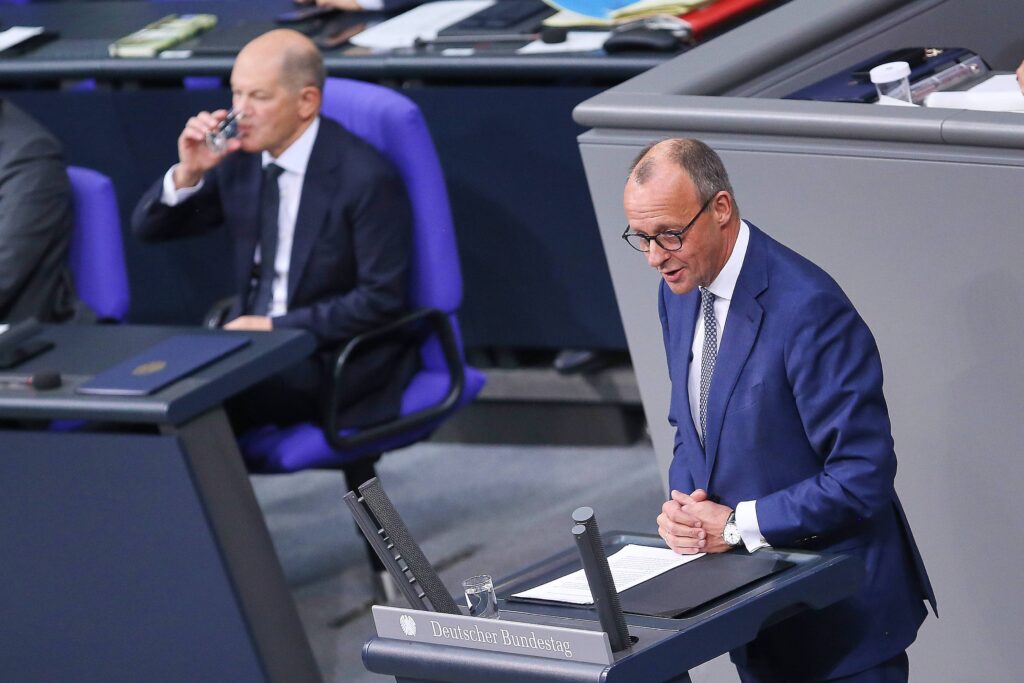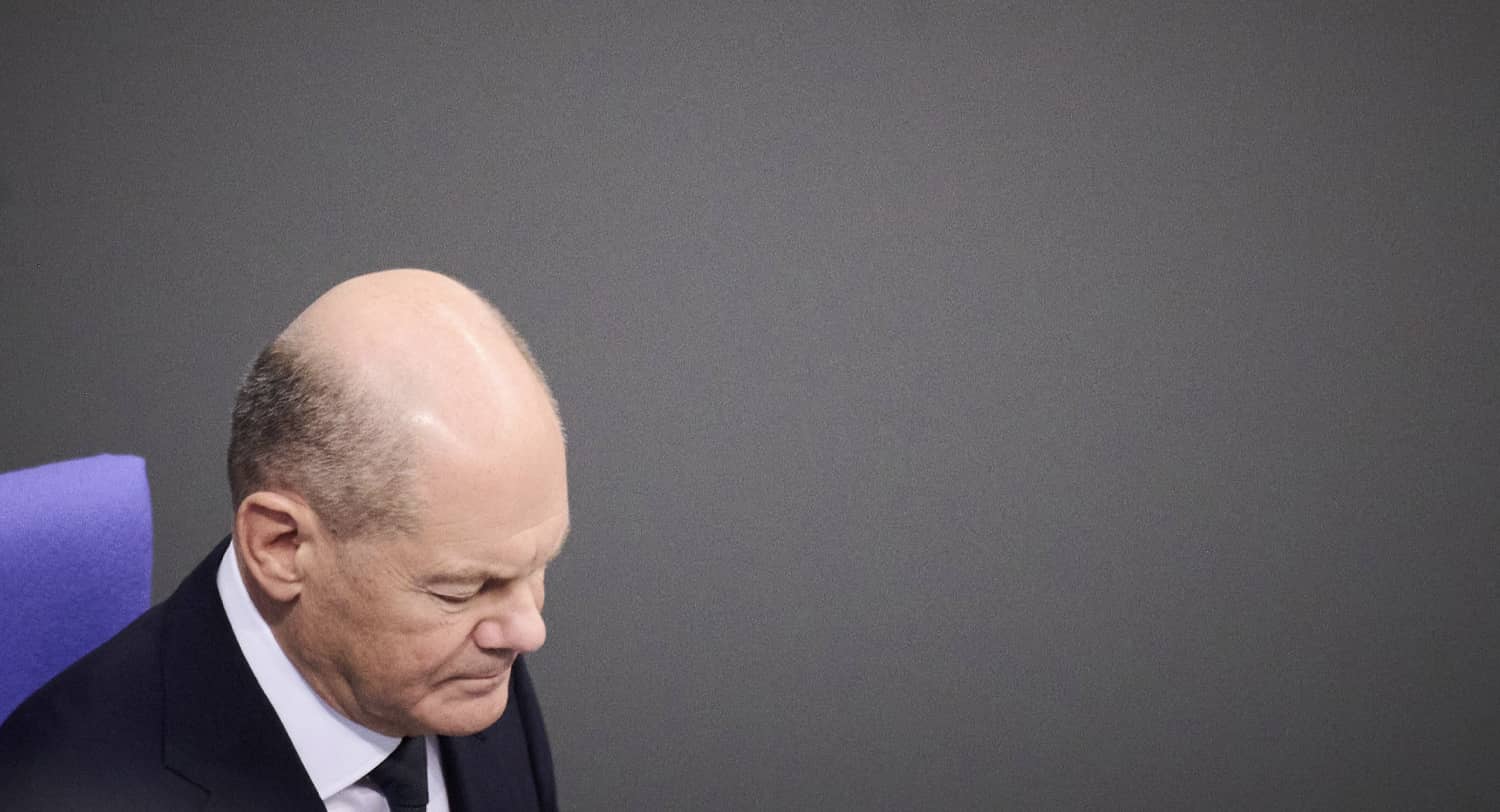Germany is facing unexpected headwinds. As Ukraine struggles to fend off Russia, the Middle East erupts, and China menaces Taiwan, it is struggling to meet a welter of domestic and foreign challenges. The recent collapse of Social Democratic chancellor Olaf Scholz’s three-party coalition has coincided with the election of Donald Trump, creating a sense of instability, if not crisis, in Germany that presages an increasingly turbulent transatlantic relationship. Germany now plans to hold snap elections on February 23.
This bout of Teutonic turmoil should not come as a surprise. Anyone who succeeded the widely popular and long-serving Christian Democratic chancellor Angela Merkel–who exited office before Russia invaded Ukraine and the German economy went south–was probably bound to have a rough time of it. For one thing, the far-right Alternative Party for Germany has battened on mounting disgruntlement in eastern Germany with immigration, economic difficulties and support for Ukraine. This nationalist party stands at close to 20 percent in opinion polls, rendering it Germany’s second strongest political party.
Then there is the ascent of the left-wing firebrand Sahra Wagenknecht. In September 2023, Wagenknecht, who was born in the eastern state of Thuringia, founded her own eponymous political party called “The Alliance of Sahra Wagenknecht.” It scored 15 percent in Saxony and 20 percent in Thuringia in recent state elections. She, too, denounces German subventions to Ukraine and espouses close ties with Putin. If her party scores well enough in February, she could become a potential coalition kingmaker.
Scholz’s woes have been compounded by the fact that his own party has been riven by the Ukraine war. One faction is demanding that Germany confront Putin and the other clings to a version of Ostpolitik, or détente with the East. The latter dreams of placating Putin, much in the spirit of the former Social Democratic chancellor Gerhard Schroeder, who celebrated his 70th birthday in St. Petersburg with the Russian dictator and publicly supported Trump’s 2024 run for the presidency. The Social Democrats are toying with the notion of running defense minister Boris Pistorius (a Ukraine hawk) as their chancellor candidate but they may be too divided to settle on him, thereby ensuring that Scholz gets the nod.
By any measure Scholz has been a disappointment. Far from proving an effective chancellor, Scholz has been a study in passivity on everything from aiding war-torn Ukraine to reviving the faltering German economy. The Zeitenwende, or time of change, that he promised in February 2022 in a speech to the Bundestag has proved to be none at all. Whether the upcoming federal elections in February will allow Germany to overcome its woes, however, is an open question.
The immediate cause of the upheaval is squabbling over the new proposed federal budget for 2025. Last week, Scholz fired the rebellious finance minister Christian Lindner whose Free Democratic Party has been sinking in the polls. The Free Democrats, in turn, exited the coalition. Unless they win at least 5 percent of the vote in the upcoming federal election, the Free Democrats will be ousted from the Bundestag, a fate that they first experienced in 2013 and have no desire to duplicate. Lindner, who was responsible for the revival of the Free Democrats after that harrowing 2013 defeat, saw the writing on the wall and helped manufacture a crisis over the budget to raise the profile of his party. The Free Democrats—in marked contrast to their coalition partners, the Social Democrats and Greens—are a pro-business party that espouses low taxes and minimal regulation.
Scholz had been relying on 29 so-called “special funds,” which totaled 869 billion Euros, to circumvent the country’s official debt brake. The federal constitutional court ruled in November 2023 that this maneuver was illegal. Its ruling set off a scramble to revise the budget that has never ended.
The feuding over the budget, though, is a symptom, not the origin, of Germany’s current difficulties, which can be traced back to the chancellorship of Angela Merkel. The Economist observed this past October that the Merkel era was in essence a time of stagnation: “16 years of no reforms are taking a toll on Germany and Europe.” Her complacency meant that Germany not only failed to undertake structural economic reforms but also allowed the Bundeswehr to disintegrate as an effective fighting force.
Merkel managed to ride out the first Trump presidency, but now Germany will have to reassess how it approaches Washington. As Jackson Janes, a resident senior fellow at the German Marshall Fund, told me, “The challenge for German-American relations will be resetting relevance. What will the Trump administration value in relations with Germany in accomplishing the President’s domestic goals as well as his global objectives? What will Germany get from Washington but what will it also need to sustain its interests in Europe and in the global game? The questions about how, when, where and why the two countries need each other are changing.”
They are indeed. A truculent Trump will pressure Berlin to live up to its promises to increase spending on the Bundeswehr and threaten it with punitive economic tariffs. Germany is now spending the NATO minimum of 2 percent of GDP, but has remained mum about how it will do so after 2027. Scholz has also refused to sanction the delivery of Taurus missiles to Ukraine. In addressing the Bundestag on November 13, he reiterated that “I am against the fact that the weapons supplied by us can be fired far into Russian territory and will not change my position regarding the delivery of a cruise missile from Germany.” His stance has been denounced by the conservative Christian Democratic Party.
What Trump will himself propose to secure peace in Ukraine remains unclear. Senator Marco Rubio, whom Trump has nominated to become Secretary of State, is a foreign policy hawk and a staunch supporter of NATO. But Trump will be the Decider when it comes to the nature and depth of America’s commitment to NATO. Curt Mills, the executive editor of the American Conservative, avers that “the era of carefree largesse afforded to Europe from Truman to Biden is over. It will be something different. And America and the continent will be better for it.”
Will they? Almost four decades after the fall of the Berlin Wall, there is no plausible evidence that Germany seeks, let alone desires, to once more become a Grossmacht, or great power, that can impose order in central Europe. In this regard, the contrast with the bad, old days of the German past could hardly be starker. In January 1849, as German liberals tried to forge a united nation in Frankfurt, the great historian F. C. Dahlman declared that “the road of power is the only one that will satisfy and appease our yearning for freedom….Germany as such must finally step forward into the ranks of the great political powers of the world.” After the Bismarckian Reich collapsed into the horrors of Nazism, postwar Germany took what amounted to a vow of abstinence from world affairs. Today, the striking thing is that in tone and substance Germany’s hesitant approach to foreign affairs has not fundamentally changed. Liana Fix, a Europe fellow at the Council on Foreign Relations, recently noted that rather than “step up as a leader of Europe and the West, the coalition abdicated leadership in Europe, avoided pressing strategic decisions, and pursued narrow national interests first.”

For some in the German establishment, the candidacy of Friedrich Merz, the chairman of the Christian Democrats, is seen as a viable path both toward fulfilling Germany’s international promise and improving relations with Trump.
Merz has decried the hesitation of Scholz, for example, to assist Ukraine more expansively, including supplying it with long-range missiles that could target Russia proper. He would likely head a grand coalition that would seek to fence out the Alternative for Germany, which is bristling at its exclusion from cooperation with the Christian Democrats. For Trump, Merz would be a more congenial figure than Scholz.
Christoph von Marschall, who is currently a Wilson Center scholar, believes that Germany is currently swerving between “wishes and reality” in coming to terms with a new Trump presidency. It dreams of claiming moral superiority over America. But if Merz is elected, he suggests, reality will set in. “Given the German lack of hard power,” Marschall observes, “Germany cannot afford a confrontation with Trump. It will pursue a policy of embracing him, much as Emmanuel Macron, Mark Rutte and Donald Tusk are attempting.”
A more dire assessment comes from Malte Lehming, a columnist for the Berlin daily Der Tagesspiegel. In his view, “Trump hates Germany. It incarnates everything that he rejects—multilateralism, an emphasis on international law, climate protection, politics based on morality.” He surmises that Trump will try to stick Germany with the tab to rebuild Ukraine: “the costs to accomplish that are unbelievably high. It seems probable that this will badly strain German-American ties.” Those ties have served as the basis of the Western alliance since the founding of NATO in 1949. As Trump returns to the presidency, the next German chancellor will have to work overtime to refurbish the relationship between Washington and Berlin.

